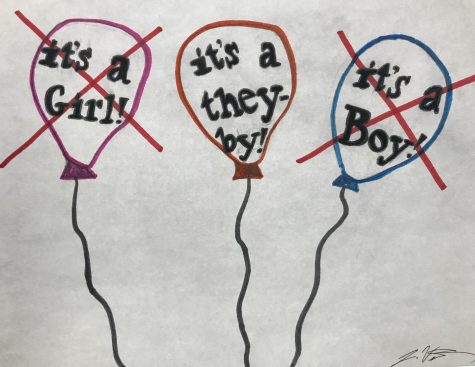The Rise of “Theybies”
October 17, 2018
BY JULIA SANTANA

With newer generations becoming more and more socially aware, some parents are leaving it up to their children to decide what gender to be, and what pronouns they want to go by. These gender-neutral babies, called “Theybies,” typically have names that don’t have a specific gender connotation, like Caden or Jordan, and choose their gender by the age of about four. Although the idea of this seems accommodating and progressive, one controversial aspect of parents raising theybies is that they never share the sex of their children to anyone.
According to an article written about theybies by NBCNews, the children “who are aware of their own body parts and how they may differ from others” are not taught to associate those body parts with being a boy or girl. The parents claim that if no one is aware of the child’s biological sex, then they cannot be subjected to gender discrimination and stereotypes. None of them, however, seem to acknowledge the very fact that them not conforming to a gender can be a reason they are discriminated against. Other kids around these theybies can be ignorant about the topic of gender identity, and therefore, may criticize and belittle the non-conforming children. In short, the chance of discrimination can happen whether children are raised with or without a clearly defined gender.
Without noticing, parents themselves tend to be biased when raising their children. According to the Handbook of Parenting, parents are more likely to talk to their sons about numbers, and use “emotion-based words” around their daughters. In addition, the handbook also reveals parents emphasize more aggressiveness in their sons than in their daughters. Kyl Myers, parent to 2-year-old Zoomer, says that the reason she is raising a theybie is because she is “very tired of the hetero-normative and normative model, and the patriarchy.” She also feels that “a part of why are parenting this way is because intersex people exist, and transgender people exist, and queer people exist, and sex and gender occur on a spectrum, yet our culture loves to think people, all 7 billion of them, can and should be reduced to either/or,” as she told to the New York Magazine.
Despite the praise that some are receiving for this parenting style, parents are receiving backlash as well. Dr. Quentin Van Meter, of the American College of Pediatricians, said parents who let their children grow up with this lifestyle will subject them to criticism and bullying later on in life. “Parents who do this are purposely putting their children in a situation where they’re going to come to a harm, that’s why it’s abusive,” he told CBN News, a conservative Christian news site. The idea of raising a “gender less” child is an interesting approach at preventing their children from experiencing certain discrimination and can be a great tool if executed correctly.
Acknowledging that not every child is going to fit the perfect “cookie cutter” mold of gender and sexuality that society imposes on them allows for tolerance to be learned and understood at a young age. As children grow older and begin to develop their own perspectives on certain topics, teaching kids about tolerance for other people with differences is great tool to erase discrimination from future generations.

